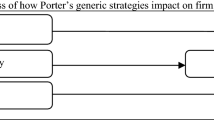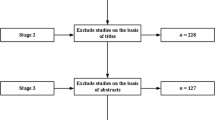Abstract
In this paper the relationship between organizational politics (OP), and company strategy and performance was explored. Data were collected from 55 manufacturing firms. Controlling for company assets and industry type, OP intensity was associated with various stages of the strategic process. In addition, it was negatively associated with overall company performance. These results were corroborated by canonical analysis. Another important finding was that the stage of company evolution moderates the OP-strategic process relationship. Finally, future research directions and implications for managerial behavior and ethics have been clarified.
Similar content being viewed by others
References
Allen, R. W., Madison, D. L., Porter, L. W., Renwick, P. A., and Mayes, B. T.: 1979, ‘Organizational Politics: Tactics and Characteristics of Its Actors’, California Management Review 22 (1), 77–83.
Andrews, K. R.: 1980, The Concept of Corporate Strategy, 2nd ed. Homewood, IL: Richard D. Irwin.
Baird, I. Power: 1984, The Theory Underlying Competitive Strategy, Paper Presented at the Academy of Management Conference (Boston, MA).
Barnes, P. W., Landro, L., and Steward, J. B.: 1986, ‘How the CBS Board Decided Chief Wyman Should Leave His Job’, The Wall Street Journal, September 12, 1 and 23.
Burgelman, R.: 1983, ‘A Model of the Interaction of Strategic Behavior, Corporate Context, and the Concept of Strategy’, Academy of Management Review 8, 61–70.
‘Braniff's Dizzying Takeoff into Deregulated Skies’, Fortune, March 26, 1979, 52–58.
Cavanagh, G. F., Moberg J., and Valesquez, M.: 1981, ‘The Ethics of Organizational Politics’, Academy of Management Review 6, 363–374.
Daft, R. L.: 1986, Organization Theory and Design, 2nd ed. St. Paul, MN: West Publishing.
Dess, G. G. and Robinson, R. B., Jr.: 1984, ‘Measuring Organizational Performance in the Absence of Objective Measures: The Case of the Privately-Held Firm and Conglomerate Business Unit’, Strategic Management Journal 5, 265–273.
DuBrin, A. J.: 1974, Fundamentals of Organizational Behavior, Elmsford, NY: Pergamon Press.
Frost, P. J. and Hayes, D. C.: 1983, ‘An Exploration in Two Cultures of a Model of Political Behavior in Organizations’, in Organizational Influence Process, Robert W. Allen and Lyman W. Porter (eds.), Glenview, Illinois: Scott, Foresman, and Company, pp. 369–392.
Gandz, J. and Murray, V. V.: 1980, ‘The Experience of Workplace Politics’, Academy of Management Journal 23, 237–251.
Gilbert, D. R., Jr.: 1986, ‘Corporate Strategy and Ethics’, Journal of Business Ethics 5, 137–150.
Glueck, W. F. and Jauch, L. R.: 1984, Business Policy and Strategic Management, 4th ed., New York, NY: McGraw-Hill Book Company.
Hambrick, D. C.: 1981, ‘Environment, Strategy, and Power Within Top Management Teams’, Administrative Science Quarterly 26, 253–276.
Harris, B.: 1984, ‘The Man Who Killed Braniff’, in R. L. Daft and Dahlen (eds.) Organization Theory: Cases and Applications, St. Paul, MN: West Publishing Company.
Johnson, R.: 1986, ‘At Pillsbury Co., Restaurants Upstage Packaged-Food Group’, The Wall Street Journal, October 23, 1 and 23.
Lemak, D. J. Power: 1985, ‘Perceptions, Politics and Performance: An Expanded Model of Strategy Formulation’, Proceedings of the Annual Meeting of the American Institute for Decision Sciences (Las Vegas, Nevada: November 11–13): 710–713.
Lindeman, R. H., Merenda, P. F., and Gold R. Z.: 1980, Introduction to Bivariate and Multivariate Analysis, Glenview, IL: Scott, Foresman, and Company.
March, J. G.: 1962, ‘The Business Firm as a Political Coalition’, Journal of Politics 24, 662–678.
McClelland, D. C.: 1979, The Two Faces of Power, in D. A. Kolb, I. M. Rubin, and J. M. McIntyre (eds.), Organizational Psychology: Book of Readings, 3rd ed. Englewood Cliffs, N. J.: Prentice-Hall, Inc.
McMillan, J. C.: 1978, Strategy Formulation: Political Concepts, St. Paul, MN: West Publishing Company.
McMillan, J. C.: 1983, ‘The Politics of New Venture Management’, Harvard Business Review 83 (6), 8–11.
Miles, R. H.: 1980, Macro Organizational Behavior, Santa Monica, CA: Goodyear.
Mintzberg, H.: 1982, Power In and Around Organizations, Englewood Cliffs, N.J.: Prentice-Hall, Inc.
Mintzberg, H.: 1973, ‘Strategy Making in Three Modes’, California Management Review 16 (2), 44–53.
Moberg, D. J.: 1978, Factors Which Determine the Perception and Use of Organizational Politics, Paper Presented at the 35th Academy of Management Conference (San Francisco, CA).
Narayanan, K. and Fahey, L.: 1982, ‘The Micro-Politics of Strategy Formulation’, Academy of Management Review 7, 25–34.
Naylor, T. H. (ed.): 1978, The Politics of Corporate Planning and Modeling, Oxford, OH: The Executive Planning Institute.
Newman, W. H.: 1985, ‘The Role of Company Culture and Internal Politics’, in J. R. Gardner, R. Rachlin, and H. Sweeny (eds.), Handbook of Strategic Planning, New York: NY: John Wiley & Sons.
Newman, W. H.: 1979, ‘Company Politics: Unexplored Dimension of Management’, Journal of General Management 5, 3–11.
Pedhazur, E. J.: 1982 Multiple Regression in Behavioral Research, 2nd ed. New York: Holt, Reinhart and Winston.
Pfeffer, J.: 1981, Power in Organizations, Boston, MA: Pitman Books Limited.
Pfeffer, J. and Salancik, G. R.: 1974, ‘Organizational Decision Making as a Political Process: The Case of a University Budget’, Administrative Science Quarterly 19, 135–151.
Quinn, J. B.: 1977, ‘Strategic Goals: Process and Politics’, Sloan Management Review 19 (1), 21–37.
Rubinstein, D., Wayne, S., and Woodman, R. W.: 1984, The Influence of “Political Influence” on Compromise and Choice in Strategic Decision Making, Paper Presented at the Academy of Management Conference (Boston, MA: August).
Thompson, B.: 1984, Canonical Correlation Analysis: Uses and Interpretation, Beverly Hills, CA: Sage Publications.
Uttal, B.: 1985, ‘Behind the Fall of Steve Jobs’, Fortune, August 5, 20–25.
Zahra, S. A.: 1985, ‘Background and Work Experience Correlates of the Ethics and Effect of Organizational Politics’, Journal of Business Ethics 4, 419–423.
Author information
Authors and Affiliations
Additional information
Dr. Shaker A. Zahra is Associate Professor of Strategic Management, Department of Management, George Mason University, Fairfax, Virginia 22030. His research centers on the role of board of directors in the strategic process, determinants of innovation in large corporations, and ethical issues associated with strategic choices.
Rights and permissions
About this article
Cite this article
Zahra, S.A. Organizational politics and the strategic process. J Bus Ethics 6, 579–587 (1987). https://doi.org/10.1007/BF00383751
Issue Date:
DOI: https://doi.org/10.1007/BF00383751




